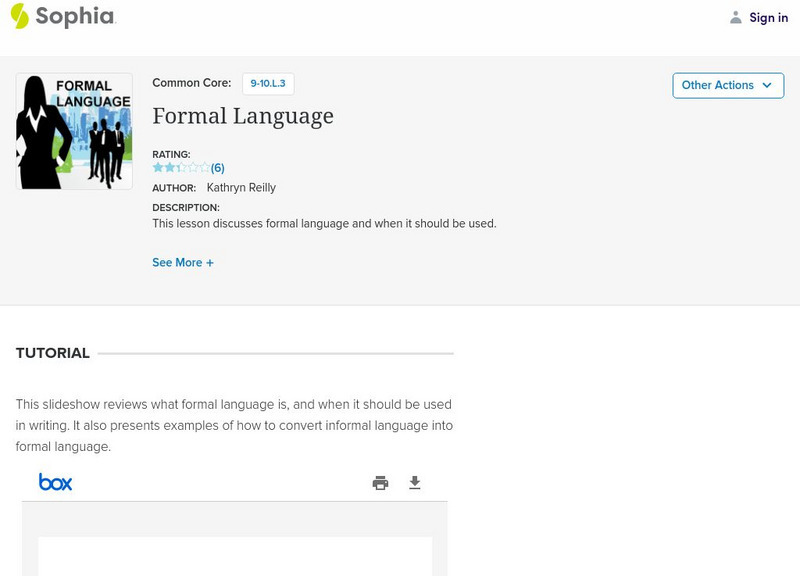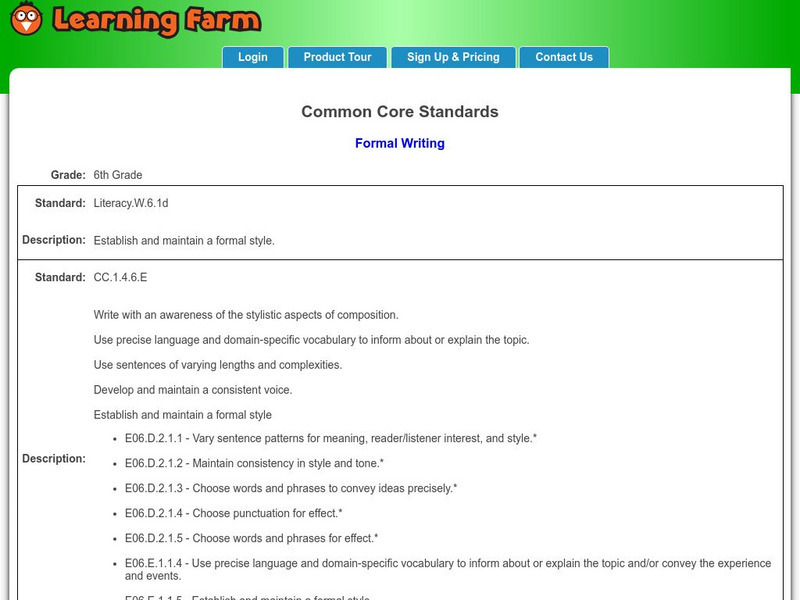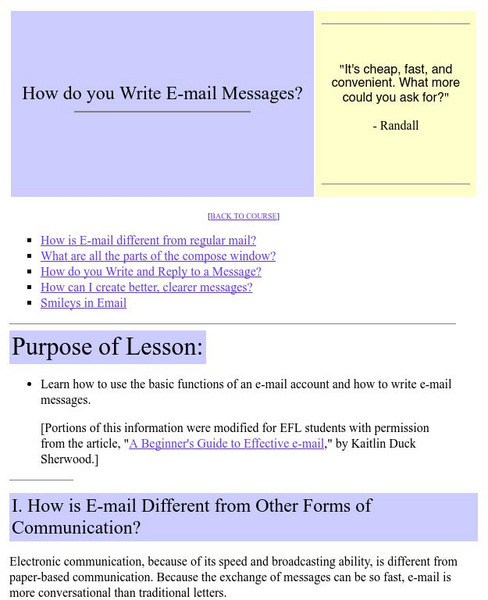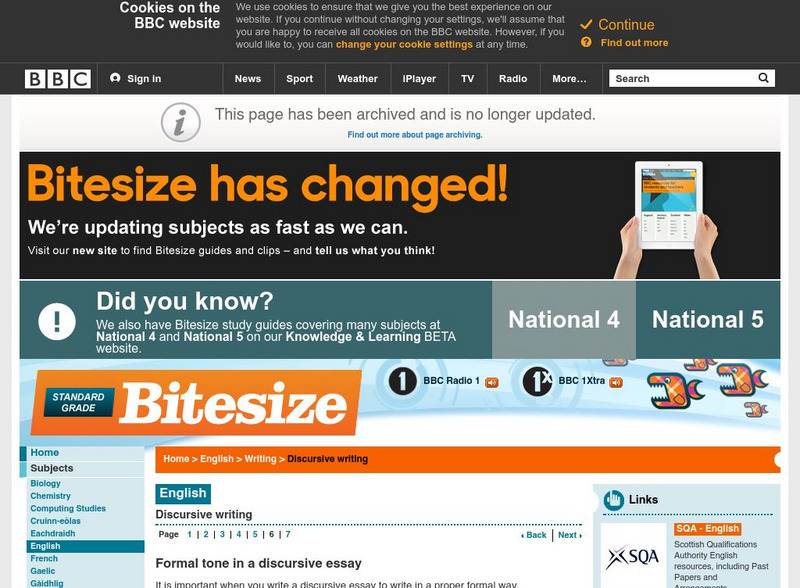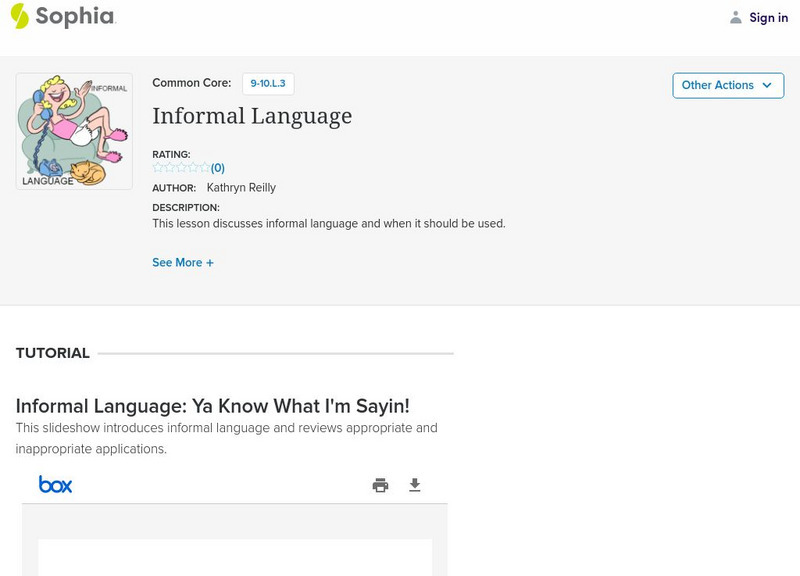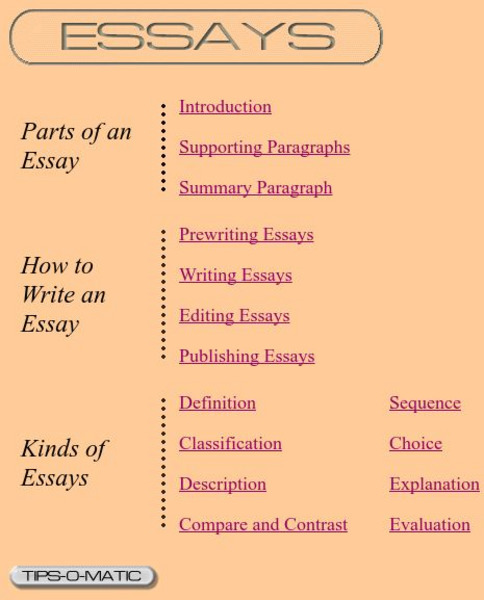Curated OER
I've Got News For You!
Students explore their hometown newspaper for ideas. They create their own classroom newspaper.
Curated OER
30 Good Reasons for Trees
Students create their own book about the role of trees in the environment. They are to come up with a list of 30 reasons they benefit the environment. They hold a publication party to release their book.
Curated OER
Quebec
Ninth graders to examine the past to find out why Quebec has been so determined to protect its cultural heritage. They access primary resources on the Internet to promote their engagement with the past.
Curated OER
Do a Ditty
Fourth graders work in cooperative groups to create a ditty to teach the characteristics that distinguish literary forms to younger students. The ditty is performed before the class.
Curated OER
Creating An African Style Mask
Students investigate the different types of African masks that are found using the internet to perform research. They draw four different images based on the images downloaded. Students must cite sources used using MLA formatting.
BBC
Bbc: Skillswise: Speaking and Listening: Formal and Informal Speaking
This Skillswise site focuses on formal and informal speaking. Included are a video about how to decide whether to use formal or informal speech, fact sheets and worksheets for instruction. The Skillswise sites from BBC are geared to...
BBC
Bbc: Skillswise: English: Formal and Informal Speaking Quiz [Pdf]
Assess the differences between formal and informal speech. Three levels of difficulty with answers provided.
Better Lesson
Better Lesson: Audience, Tone, and Style in Informative Text
Students will read samples of informative writing and highlight examples of how tone and style are used by the authors. Students will then apply this knowledge by writing their own informative text. Multiple examples of student work and...
Department of Defense
Do Dea: Conventions
Sharpen your use of the formal conventions of English with this self-guided learning module. The module focuses on formal and informal language, making pronouns agree with their antecedents, and common spelling and grammar errors. At the...
BBC
Bbc Bitesize: Speaking and Listening: Standard English
Explains what standard English is and when it is used, the difference between formal and informal language, and non-standard forms of English such as those found in dialects.
Online Writing Lab at Purdue University
Purdue University Owl: Academic Writing: Levels of Formality
Basic information explaining how the context, i.e., the audience and your purpose, determines whether you should use formal, semi-formal, or informal language. The links on the sidebar provide much more information about formal academic...
Sophia Learning
Sophia: Paper Writing: Outlines
Show students how essential an outline is to writing a paper. This source provides explanations for writing an outline and information about how to create both formal and informal outlines.
TES Global
Tes: Letters: Formal & Informal
[Free Registration/Login Required] This resource provides explanations for different modes of writing. Examples of informal and formats are provided.
Annenberg Foundation
Annenberg Learner: Workshop 6: Responding to Writing: Teacher to Student
"Responding to Writing: Teacher to Student" [58:21] demonstrates how five teachers Jenny Beasley, Vivian Johnson, Mary Cathryn Ricker, Laurie Swistak, and Jack Wildea use student-teacher conferences to help their students improve as...
Sophia Learning
Sophia: Formal Language
This slideshow lesson focuses on formal language. It reviews the basics of formal language and the need to know your audience. It explains how to change various types of informal language into formal language and provides examples....
Learning Farm
Learning Farm: Common Core Standards: Formal Writing
Writing formally means writing using words that are precise, objective, and impersonal. This lesson gives examples of formal language and also provides games and a test. CCSS.ELA-Literacy.WHST.6-8.2.e
Grammarly
Grammarly Handbook: Informalities
A list of style techniques (with examples) used to create an informal tone in a written piece.
Randall Davis
Esl Net world.com: How Do You Write E Mail Messages?
This tutorial explains writing email messages in formal and informal style using Hotmail. It explains the steps taken in composing, replying to, and sending messages.
CK-12 Foundation
Ck 12: 7.1: Tone and Style
[Free Registration/Login may be required to access all resource tools.] Gain a better understanding of tone and style by understanding formal and informal style, learning to write clearly, correcting vague sentences, distinguishing...
BBC
Bbc Skillswise: Writing a Letter
This Skillswise site focuses on letter writing. Included is a video about why it is important to learn about letter writing, fact sheets and worksheets for instruction, and quizzes on the information presented. The Skillswise sites from...
BBC
Bbc Bitesize Revision: Formal Tone in a Discursive Essay
This page provides several tips for using formal tone in an essay. The tips are arranged into 'Do' and 'Do not use' categories.
Sophia Learning
Sophia: Informal Language
This lesson discusses informal language and when it should be used. SL.9-10.6 Adapt to task/formal
ACT360 Media
Writing Den: Essay Writing Tips
All you want to know about writing essays, from prewriting to editing. Click on the tip-o-matic and find tips on anything dealing with grammar or writing.
Grammarly
Grammarly Blog: Anytime vs. Any Time
This page focuses on changes in language usage pertaining to "anytime" and "any time." In informal writing "anytime" can be used, but in formal writing "any time" is perferable. Examples are provided.






![Bbc: Skillswise: English: Formal and Informal Speaking Quiz [Pdf] Unknown Type Bbc: Skillswise: English: Formal and Informal Speaking Quiz [Pdf] Unknown Type](http://lessonplanet.com/content/resources/thumbnails/411268/large/bwluav9tywdpy2symdiwmduymc0ymtiwny1jegxunwmuanbn.jpg?1589993555)







